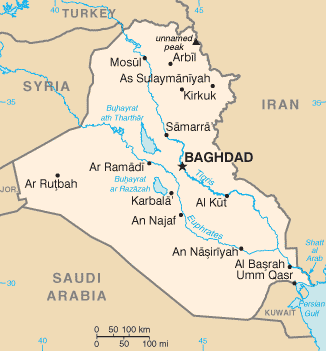Ba'athist Iraq facts for kids
Quick facts for kids
Republic of Iraq
جمهورية العراق
Jumhūriyat Al-Irāq (Arabic) |
|||||||||
|---|---|---|---|---|---|---|---|---|---|
| 1968–2003 | |||||||||
|
|
|||||||||
|
Motto: Allāhu Akbar
(1991-2003) |
|||||||||
|
Anthem: Ardulfurataini Watan
("The Land of The Two Rivers", 1979-2003) |
|||||||||

Map of Iraq.
|
|||||||||
| Capital and largest city
|
Baghdad | ||||||||
| Common languages | Arabic, Kurdish | ||||||||
| Government | Dominant-party system | ||||||||
| President | |||||||||
|
• 1968-1979
|
Ahmed Hassan al-Bakr | ||||||||
|
• 1979-2003
|
Saddam Hussein | ||||||||
| History | |||||||||
|
• Coup and overthrow of Abdul Rahman Arif
|
17 July 1968 | ||||||||
|
• Creation of the Coalition Provisional Authority
|
17 April 2003 | ||||||||
| Currency | Iraqi dinar | ||||||||
| ISO 3166 code | IQ | ||||||||
|
|||||||||
Ba'athist Iraq is the name for Iraq when it was ruled by the Arab Socialist Ba'ath Party. This period lasted from 1968 to 2003. The Ba'ath Party came to power after Ahmed Hassan al-Bakr led a sudden takeover of the government. This takeover removed Abdul Rahman Arif from power.
The Ba'ath Party believed in uniting all Arab countries. They also supported government control over the economy and keeping government separate from religion. Iraq became a country where one political party had most of the power. In 1979, al-Bakr stepped down as President. Saddam Hussein then took over. The Ba'athist government ended in 2003. This happened after many countries invaded Iraq. The Coalition Provisional Authority then took charge.
Contents
Iraq's Land and Borders
From 1968 to 2003, Iraq mostly kept its current borders. There was a disagreement about the border with Saudi Arabia until 1981.
During the Iran–Iraq War (1980-1988), Iraq tried to take over parts of Iran. Later, from 1990 to 1991, Iraq took over Kuwait. The United Nations said this was against the law. They did not agree with Iraq taking over Kuwait. An international group of countries then forced Iraq to leave Kuwait. This happened during the Gulf War. After this, Kuwait became an independent country again.
A Look at History
Ahmed Hassan al-Bakr's Time as President
When al-Bakr became leader, the Ba'ath Party controlled the government. They worked with the Iraqi Communist Party.
Saddam Hussein's Time as President
Saddam Hussein became President after al-Bakr resigned. Hussein made big changes to the Ba'ath Party. The party became more like a military group. Its members even started wearing uniforms.
The Iran-Iraq War
Soon after becoming President, Saddam Hussein started a war with Iran. This war lasted for eight years, from 1980 to 1988.
The Gulf War
In August 1990, Saddam Hussein started a war with Kuwait. He said Kuwait was unfairly taking oil from Iraqi land. After taking over Kuwait, Hussein said Kuwait was now part of Iraq.
The United Nations (UN) said Iraq's actions were illegal. They told Iraq many times to leave Kuwait. The UN also put limits on Iraq to make them leave. In 1991, the UN allowed other countries to use military force. A group of countries, led by the United States, attacked Iraqi forces in Kuwait. They defeated Iraq's army. As Iraqi forces left Kuwait, they set fire to many oil wells. This caused huge fires across Kuwait's oil fields. The attacking forces also damaged buildings and roads in Iraq.
Weapons Inspections and Limits
After losing the Gulf War, Saddam Hussein agreed to let UN experts check for dangerous weapons. He also agreed to get rid of any Weapons of Mass Destruction (WMDs). The UN also set up "no-fly zones" over parts of northern and southern Iraq. This meant Iraqi planes could not fly there.
In 1998, Iraq said that UN weapons inspectors were spies. Iraq then made the UN inspectors leave the country.
Images for kids
-
Ahmed Hassan al-Bakr was Iraq's leader from 1968 to 1979.
-
Adnan Khairallah, Iraq's Defense Minister, meeting with soldiers. This was during the Iran–Iraq War.
-
Alexei Kosygin (left) and Ahmed Hassan al-Bakr signing a treaty in 1972.
-
Iraqi soldiers riding an armored vehicle in 2003. This was one month before the Iraq War started.
See also
 In Spanish: Irak baazista para niños
In Spanish: Irak baazista para niños









